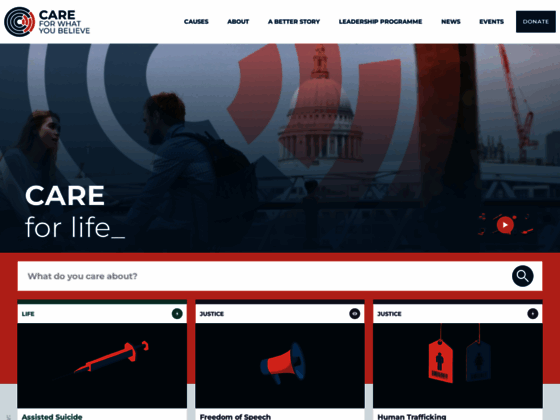Should a Christian be involved in politics? – Christian influence in a secular world
Christianity continues to make an impact – not just with words – but through positive actions, both here in the UK and far beyond. In this article we will unpack the question should a Christian be involved in politics? a little more and provide some additional reading.
Active Christians are passionate about many areas of life including politics and advocacy. Critical good work in these areas is continuing through many Christian rooted charities and organisations. It may feel like the Christian’s voice, particularly in the political arena, has been heavily subdued by the secular world, but it still very much alive – and active.
In this article:
Choose from…
Why should Christians get involved in politics?
1. Voting and participating in the democratic process allow us to have a say in decisions that shape our society. It means we can influence laws and policies that align with our beliefs. By advocating for compassionate and fair policies, we can help create a society that reflects Christian values of love, justice, and stewardship.
2. Getting involved means our voices are more likely to be heard and our values represented, whatever the current and important issues are like healthcare, education, or social justice.
3. Getting involved in politics is a key way to fulfill our civic duty.
4. Political participation helps protect our fundamental rights and freedoms. In a diverse and pluralistic society, it’s crucial to ensure that everyone’s rights are respected.
5. By being active in politics, we can help to safeguard freedoms such as religion, speech, and ensuring a society where different beliefs can coexist peacefully.
Choosing not to get involved
Whenever Christians are complacent or choose to step back from getting involved with politics, undoubtedly the influence of Christianity in politics will decline.
Some Christians argue that Jesus didn’t directly get involved in any politics. That could perhaps be a reasonable conclusion to draw from the Bible narrative. However, this does not necessarily mean that today we shouldn’t be involved and influencing or making political decisions.
On this page, in the light of the 2024 general election, we have collected together some information, resources and useful links all related specifically to Christianity and politics. Our hope is that this page and the additional links and resources included will help you in the future to answer the question should a Christian be involved in politics?
What about Jesus’ involvement with politics?
He focused on spiritual authority
In the New Testament, Jesus’ involvement with politics is primarily focused on spiritual rather than temporal authority. Jesus lived during Roman occupation, and His teachings often intersected with political issues. He emphasised the Kingdom of God over earthly kingdoms, indicating a distinction between spiritual and political realms. When asked about paying taxes to Caesar, He responded, “Render therefore unto Caesar the things which are Caesar’s; and unto God the things that are God’s” (Matthew 22:21), highlighting the importance of fulfilling civic duties while prioritising divine allegiance.
He challenged the political and religious leaders at the time
Jesus also challenged the political and religious leaders of His time. He criticised the Pharisees and Sadducees for their hypocrisy and legalism, which had political implications given their influence in Jewish society. His cleansing of the temple (Matthew 21:12-13) was a direct confrontation of the commercial and corrupt practices endorsed by the temple authorities, disrupting the economic and political status quo.
His focus was on spiritual salvation rather than political power
Jesus’ primary mission was spiritual. He rejected attempts to be made a political king (John 6:15) and He taught that His kingdom was “not of this world” (John 18:36), underscoring His focus on spiritual salvation rather than political power.
Relevant Bible verses: Matthew 22:21, Matthew 21:12-13, John 6:15, John 18:36.
From these points we could perhaps decide that it isn’t right to be involved in politics. However, we think that the fact Jesus did challenge the political leaders of the time, means that perhaps we can be involved in politics. We should always be involved with prayerful Christian care and consideration at all times.
Anyone that is allowed to vote democratically, has the opportunity to offer an opinion and the possibility of helping to bringing about positive changes in their environment and beyond – even if just to vote. A Christian with a Christian spiritual world-view and a strong understanding and belief in the power of God and prayer for bringing about change is crucially important for positively supporting democratic processes.
The Christian argument for voting or being involved…
Firstly, many Christians believe in the biblical principle of stewardship, which includes being responsible citizens and participating in the governance of their society to promote justice, peace, and the common good. This aligns with the command to “seek the welfare of the city” (Jeremiah 29:7).
Secondly, involvement in politics allows Christians to advocate for laws and policies that reflect their moral values and ethical beliefs, such as protecting human life, supporting family structures, caring for the poor and vulnerable, and promoting religious freedom. Engaging in the political process is a way to influence societal norms and ensure that the government upholds these principles.
Thirdly, the democratic process provides an opportunity for Christians to exercise their voice and vote to support candidates and parties that align with their beliefs. By doing so, they can contribute to the development of a society that respects and upholds Christian values.
Fourthly, active political participation can be seen as a way to live out the commandment to love one’s neighbour (Mark 12:31) by striving for a fair and just society where the rights and dignity of every person are respected.
By voting and getting involved in politics, Christians can play a crucial role in shaping the moral and ethical landscape of the UK, ensuring that their faith is reflected in the public sphere.
The ‘secular’ argument…
There are several non-biblical reasons why a Christian might want to vote or get involved with politics in the UK. In essence, voting and political engagement allow Christians to play an active role in shaping the society they live in.
Firstly, political engagement is a fundamental aspect of a democratic society. Christians can contribute to the decision-making process that affects their daily lives, including healthcare, education, and economic policies.
Secondly, political involvement allows individuals to have a say in the future direction of their country. Through voting and activism, Christians can support policies and leaders who align with their vision for a just and equitable society. This ensures that diverse perspectives, including those informed by Christian values, are represented in public discourse.
Thirdly, political participation is a means of protecting and advancing human rights. By engaging in the political process, Christians can advocate for the protection of freedoms such as speech and religion.
Fourthly, involvement in politics can lead to positive social change. With social justice and environmental issues at the forefront of many people’s minds, being involved in politics and choosing to vote can help address societal issues such as poverty, inequality, and environmental sustainability.
Links to advice about political issues and advocacy – UK and world
 CARE (Christian Action, Research & Education) For more than 35 years, CARE has been a voice for truth in the public square. |  Christian Medical Fellowship We empower members in their workplace, through government and in the media to advocate for vulnerable people; we publish peer-reviewed and clearly written resources; and make authoritative submissions to government and other official bodies. |
 Christians in Politics Christians in Politics is an all-party, non-denominational organisation which seeks to encourage and inspire Christians to get involved in politics and public life. |  Churches Together in Britain and Ireland – Social Justice Churches have long been concerned with fairness in society, particularly related to poverty and homelessness. A range of information and links. |
 Evangelical Alliance – public policy The Evangelical Alliance has been speaking up for Jesus in society for more than 170 years because we passionately believe that Jesus is good news for society and that Christians should be deeply involved in every part of our world. |  Open Doors – Advocacy Together, we can reach those where persecution hits hardest. |
 The Christian Institute The Christian Institute exists for the furtherance and promotion of the Christian religion in the United Kingdom and elsewhere. |
Books from the UK Christian Web bookshop about Christainity and politics
Links to more information and help
These links include some christian advocacy websites – all working toward justice, truth, equality alongside politics.
We are aware this is just a starting point and there are many, many other Christian organisations who could be listed on this page. If you have a suggestion for a link we can add, please let us know the details.
Should Christians get involved with politics? – Some related Bible verses:
The Open Bible – Politics and Religion
100 Bible Verses About Politics – BibleGen
Bible Verses about Government – Bible Study Tools
Bible Verses about Voting – Christianity.com
Bible Verses about Mixing Religion and Politics – Open Bible
Further reading – Christianity and politics:
How should a Christian view politics? – Got Questions
I don’t agree with any party. How should I vote as a Christian? – Premier Christianity
Help! I am a Christian. Is it OK not to vote? – Premier Christianity
Britain and the Bible (PDF) – Bible Society
Inspiring and encouraging Christians to get involved in politics and public life – Christians in Politics
Can Christians join in with Politics? – UCCF
Why should Christians care about politics – Tearfund
Christianity and Politics – Wikipedia
Can Christians join in with Politics? – Premier Christianity
Did Jesus get directly involved with politics – Don Stewart, Blue Letter Bible
5 reasons Christians don’t get involved in politics – Christians in politics
Politics – Evangelical Alliance
Christianity and Party Politics – Thoes Think Tank
The Church gets involved in politics because that’s what Jesus did – Justin Selby
Election 2024 – Thinking faithfully about politics (PDF) – Evangelical Alliance
Should the Church get involved with politics? -Billy Graham
How confident do Christian leaders feel about the Bible and politics? – Bible Society
5 Reasons Christians Should Influence Governments – Christian Action, Research, and Education
Christianity and Politics – Christians in Parliament
What Did Jesus Teach about Politics? – Crossway
Have we missed something?
If you know of another website or information which would be appropriate for this section, please contact us with details.
Photo by Ugur Akdemir on Unsplash



